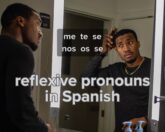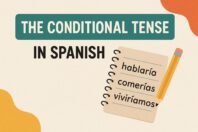Spanish Grammar: How to use Recordar vs Acordarse?

Get our free email course, Shortcut to Conversational.
Have conversations faster, understand people when they speak fast, and other tested tips to learn faster.
More infoDo you find it difficult to remember the difference between Spanish verbs Recordar v Acordarse.
As a Spanish student, you’ll quickly notice that native speakers tend to use both verbs interchangeably.
The 1-second guide to understanding both verbs is that:
- Recordar = to recall/remember
- Acordarse = to remember
Although both verbs can be used to express the action to remember, there are certain rules that you need to know about using each one.
Recordar requires a complement in order to make sense, and will always be used with a noun, pronouns, phrases or clauses.
- I remember he was a skinny, nice guy. – Recuerdo que era un flaco simpático.
- I remember that morning when we saw snow for the first time. – Recuerdo aquella mañana cuando vimos la nieve por primera vez.
Acordarse does not require a complement, but is always followed by the preposition “de”.
- Of course, I remember you. – ¡Por supuesto que me acuerdo de ti!
- I didn’t remember to tell Juan, I’m sorry. – No me acordé de decirle a Juan, lo siento.
There is an easy way to help you distinguish both verbs: recordar is never followed by the preposition “de” and always require a complement.
Let’s say that you want to say “remember to bring the book tomorrow”.
The below is incorrect:
- Recuérdate de traer el libro mañana
The correct way to express that thought is:
- Acuérdate de traer el libro mañana.
How to Use Recordar
We already covered some examples of recordar being used as “to remember”
In a certain context, it can also mean “to remind”.
- Your cakes remind me of the sweet taste of the spring. – Tus tortas me recuerdan al dulce sabor de la primavera.
- The smell of her perfume reminds me of thousands of flowers. – El olor de su perfume me recuerda a miles de flores.
- I must remind my parents about what happened last night. – Debo recordarles a mis padres lo que pasó anoche.
How to Use Acordarse (or Acordar)
Another thing that seems to confuse students is the difference between acordarse vs acordar.
If you already studied reflexive verbs in Spanish, then you’ll know that reflexive pronouns can completely change the meaning of a verb.
This is exactly what we see here:
- Acordarse = to remember
- Acordar = to agree
Some examples:
- Do you remember the smell of your mother? – ¿Te acuerdas del aroma de tu madre?
- I don’t agree with your opinion about the civilization in 2050. – No estoy de acuerdo con tu opinión acerca de la civilización en el 2050.
We need to mention: “De acuerdo”
Anyone reading this who has already traveled to a Spanish speaking country may be familiar with this expression.
De acuerdo is commonly used to express agreeing on something or with someone.
Sometimes it will be accompanied by the verb estar to add extra information, but it means the exact same thing when used on its own.
Let’s take a look at come examples.
- What about if we eat first and then go to the party? Good idea, I agree
- ¿Qué tal si primero comemos y luego vamos a la fiesta? Buena idea, estoy de acuerdo
- I think it would be nice to visit your parents this weekend?I was about to tell you the same, I agree with you.
- ¿Creo que sería buena idea visitar a tus padres este fin de semana? Estaba por decirte lo mismo, estoy de acuerdo contigo
- I think it is better to submit the project with some recommendations. Yes, I agree!
- Creo que es mejor entregar el proyecto con algunas recomendaciones. Si, ¡de acuerdo!
(PS, you will probably hear acuerdo (agreement) being used as a noun on a frequent basis than the verb)
Recordar v Acordarse: Exercises
Choose the best option among the alternatives to complete the sentences:
1.- I ______ with your argument against the abortion. – _______________ con tu argumento en contra el aborto.
2.- I ___________ when I bought this guitar for my brother. – Yo __________ cuando compré esta guitarra para mi hermano.
3.- Erick _____________ the fragrance of the black coffee while he reads a good book. Erick ___________ del aroma del café negro mientras lee un buen libro.
4.- My mom _________________ the first day of her marriage with my dad, it’s very special for her. – Mi mamá ____________ el primer día de su matrimonio con mi papá, es muy especial para ella.
5.- The police don’t ______ with the salary they currently earn. – La policía no ______________ con el salario que devengan actualmente.
6.- The lawyer didn’t _______ his password to log in his bank account yesterday. – El abogado no __________ su contraseña para ingresar a su cuenta bancaria ayer.
7.- You __________ me of my sweet voice’s girlfriend and you’re very kind. – Tú ______________ a la voz de mi novia muy dulce y eres muy amable.
8.- My father didn’t ____________ to call my doctor. – Mi papá no _______ llamar a mi doctor.
Answers
1.- I agree with your argument against the abortion. – Yo estoy de acuerdo con tu argumento en contra el aborto.
2.- I remember when I bought this guitar for my brother. – Yo recuerdo cuando compré esta guitarra para mi hermano.
3.- Erick remembers the fragrance of the black coffee while he reads a good book. Erick recuerda del aroma del café negro mientras lee un buen libro.
4.- My mom remembers the first day of her marriage with my dad, it’s very special for her. – Mi mamá recuerda el primer día de su matrimonio con mi papá, es muy especial para ella.
5.- The police don’t agree with the salary they currently earn. – La policía no está de acuerdo con el salario que devengan actualmente.
6.- The lawyer didn’t remember his password to log in to his bank account yesterday. – El abogado no recordó su contraseña para ingresar a su cuenta bancaria ayer.
7.- You remind me of my sweet voice’s girlfriend and you’re very kind. – Tú me acuerdas a la voz de mi novia muy dulce y eres muy amable.
8.- My father didn’t remember to call my doctor. – Mi papá no recordó llamar a mi doctor.



